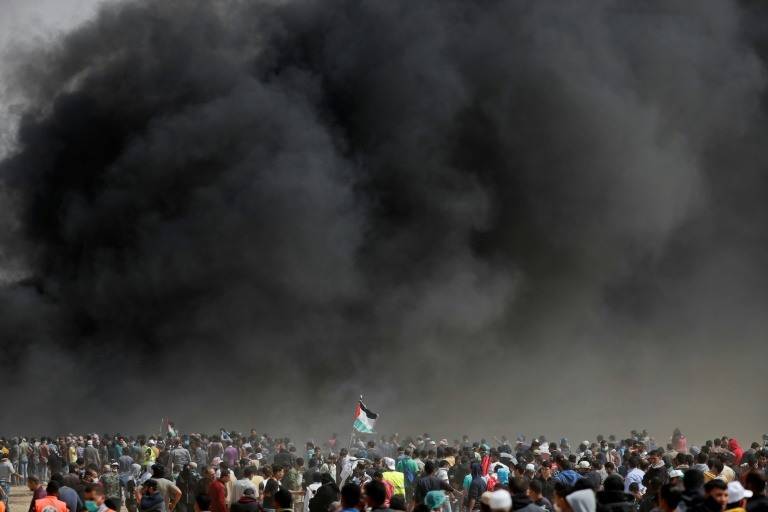Clashes erupted as thousands protested for a third consecutive Friday along Gaza's border with Israel after violence in which Israeli forces have killed 33 Palestinians and wounded hundreds of others.
Clashes between stone-throwing Palestinians and Israeli soldiers took place in multiple spots along the border while tear gas and plumes of black smoke from burning tyres filled the air in some areas.
At least 30 Palestinians were wounded, the health ministry in Gaza said, with one shot in the head.
Ten medics were treated for tear gas inhalation after a canister landed in their site, the ministry said.
Israel's army alleged there were attempts to damage and breach the border fence, while it said firebombs and "an explosive device" were thrown.
Palestinians also sought to pull away barbed wire set up by Israeli forces to keep them away from the fence, an AFP journalist said.
The military said soldiers were responding "with riot dispersal means and are firing in accordance with the rules of engagement."
In northern Gaza, a large Israeli flag was burned that had earlier been set on the ground for protesters to walk over.
Dozens of Israeli flags were being burned in Jabalia in northern Gaza and hundreds of Palestinian ones were held aloft.
Near Khan Yunis in the south, protesters burned pictures of Israeli Prime Minister Benjamin Netanyahu, US President Donald Trump and Saudi Crown Prince Mohammed bin Salman, whom they view as cooperating with Israel.
The protests since March 30 have posed a challenge to Israel, which has dismissed criticism of its use of live fire, saying its rules of engagement are necessary and will not change.
Calls for independent probe
In the northern Gaza Strip, Sumaya Abu Awad, 36, attended the protest with her three daughters and son.
"I am from the village of Hiribya and it is my right to return to it," she said, referring to a village north of Gaza destroyed in the 1948 war surrounding Israel's creation.
"I am not afraid of death because there is no life in Gaza already."
The protests, planned to last six weeks, are calling for Palestinian refugees to return to their former homes that are now inside Israel -- which Israelis say essentially amounts to calling for the country's destruction.
The first two Fridays -- with far less on intervening days -- saw tens of thousands gather near the border with Israel at five locations.
Smaller numbers approached the fence, throwing stones and rolling burning tyres toward soldiers taking up positions on the other side.
There were so far fewer protesters on Friday than in the previous two.
Israel accuses Hamas, the Islamist movement that runs Gaza and with whom it has fought three wars since 2008, of using the protests as cover to carry out violence.
It has pledged to stop attacks, damage to the fence and infiltration bids, and says there have been attempts at all three.
But Palestinians say protesters are being shot while posing no threat to soldiers, and UN Secretary-General Antonio Guterres and the European Union have called for an independent investigation.
'Excessive and lethal force'
The dead from last Friday included a journalist, Yasser Murtaja, who witnesses said was wearing a press vest at the time he was shot.
Israel claimed he was a paid member of Hamas, but produced no evidence.
The company Murtaja co-founded had been vetted for US government funding, while an international journalists federation said he was harassed and beaten by Hamas police in 2015.
Rights groups have strongly criticised Israeli forces while pointing to unverified videos that have spread online of Gazans appearing to be shot, including one seeming to show a Palestinian targeted as he ran away from the fence while holding a tyre.
"The Israeli authorities must put an immediate end to the excessive and lethal force being used to suppress Palestinian demonstrations in Gaza," Amnesty International said Friday.
Hamas officials have said in recent days they want this week's protest to see less bloodshed and hope to keep momentum building for May 14, when the United States is expected to move its Israel embassy from Tel Aviv to Jerusalem.
The embassy move has deeply angered the Palestinians, who see the Israel-annexed eastern sector of Jerusalem as the capital of their future state.
Organisers also again said they want the protest to be peaceful this week, but it is unclear to what extent they or even Hamas remain in control.
The official end date of the protests is May 15, when Palestinians mark the Nakba, or "catastrophe," commemorating the more than 700,000 who fled or were expelled during the 1948 war surrounding Israel's creation.
Gaza has been under an Israeli blockade for more than 10 years, while its border with Egypt has also been largely closed in recent years.






